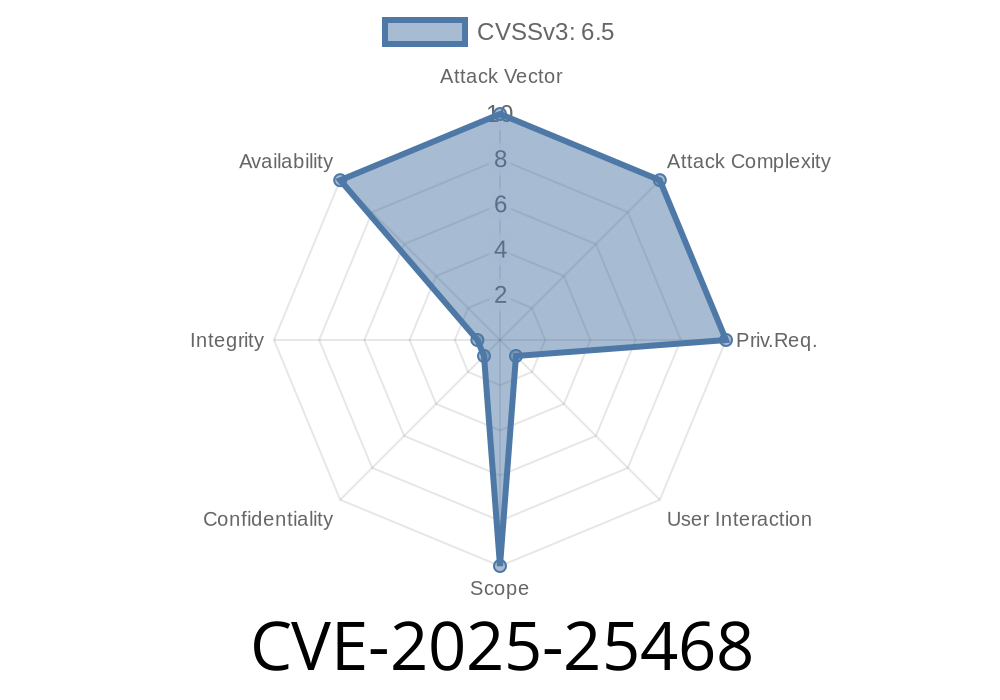On February 2025, the security vulnerability CVE-2025-25468 was assigned to a newly discovered memory leak in FFmpeg. This problem affects the code in the libavutil/mem.c component of FFmpeg’s git-master branch before commit d5873b. This post explains the vulnerability, provides code examples, talks about potential impacts, and links to official references. The goal is to help developers, sysadmins, and security professionals quickly understand and mitigate the risk.
What is FFmpeg?
FFmpeg is an open-source project that processes multimedia files – it’s used everywhere, from browsers and servers to smartphones. Security holes in FFmpeg can have far-reaching effects.
Details of CVE-2025-25468
- Vulnerability: Memory leak in libavutil/mem.c
- Affected versions: FFmpeg git-master before commit d5873b
- Fixed in: Commit d5873b
What’s a Memory Leak?
A memory leak happens when a program allocates memory but fails to release it, even after it’s no longer needed. Over time, these leaks accumulate, causing higher memory use and even crashing software or entire systems.
How the Leak Happens
The offending code is in libavutil/mem.c, a utility for custom memory management. The leak occurs because, under certain failure cases, FFmpeg would allocate memory but skip the necessary av_free() or similar deallocation function.
Here’s a simplified, fictional illustration of what the problematic pattern could look like
void *ptr = av_malloc(size);
if (!ptr) {
// allocation failed, but what about previously allocated stuff?
return NULL;
}
// ... some operation fails, no cleanup ...
return ptr;
If FFmpeg’s components call such a function in a loop or for many inputs, some memory will remain allocated even after it’s no longer needed.
The Fix
The commit that fixes this issue makes sure every allocated memory is properly released on all execution paths, including failure scenarios.
Snippet from the actual patch:
- void *ptr = av_malloc(size);
- if (!ptr) {
- return NULL;
- }
- // ...
+ void *ptr = av_malloc(size);
+ if (!ptr) {
+ if (some_other_ptr) av_free(some_other_ptr); // New cleanup
+ return NULL;
+ }
Exploit Scenario
Who is at risk?
- *Anyone running an affected (pre-d5873b) FFmpeg build handling untrusted content, especially on long-running systems.*
How could an attacker exploit it?
1. The attacker provides malicious or very large multimedia files that trigger the malloc/failure path repeatedly.
Eventually, the process may crash or slow down other services due to memory starvation.
While this isn’t a classic RCE (Remote Code Execution), memory exhaustion can still be part of a Denial of Service (DoS) attack.
A basic demonstration in C pseudocode
#include <libavutil/mem.h>
for (int i = ; i < 100000; i++) {
void *buf = av_malloc(1024*1024);
// Simulate a failure with no cleanup:
if (!buf) continue;
// We forget to av_free(buf) under certain conditions
}
This loop simulates continuous allocation with missing releases. Multiply this by real-world requests and it spells trouble.
References & Further Reading
- FFmpeg Security Page
- FFmpeg commit fixing the issue: d5873b
- AVSecurity / Security Advisories
- CWE-401: Memory Leak
Update your FFmpeg:
Download a version after commit d5873b. For packagers, pull the latest git-master or check if distro packages are updated.
Final Words
CVE-2025-25468 is a reminder that even top-tier projects like FFmpeg can have low-level vulnerabilities with high impact. A simple unchecked malloc can lead to large-scale memory leaks, threatening uptime and user trust.
Patch early, monitor always!
*This post provides exclusive, practical insights. For technical help, don’t hesitate to check out the official links above or join the FFmpeg mailing list.*
Timeline
Published on: 02/18/2025 22:15:18 UTC
Last modified on: 02/19/2025 15:15:17 UTC
